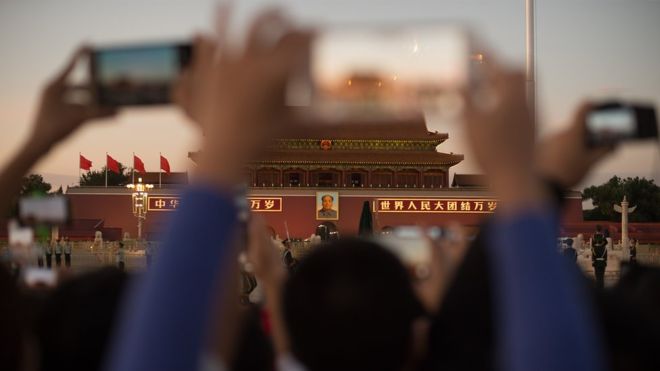Will tech firms challenge China's 'open' internet?
Wed Dec 06, 2017
China has been smart and ruthless in its control of the internet within its borders. It blocks some foreign sites altogether and it censors - heavily - what Chinese are allowed to see.
Nonetheless the big idea at this gathering is openness.
There wasn't much openness about the 'great firewall' that keeps out Twitter, Facebook, Google and the New York Times to name a few.
Not from the government minister I hastily followed down a corridor. Not from a senior Facebook executive. Not from one of the co-founders of LinkedIn.
Chen Zhaoxiong's minders tried to push me away and the familiar hand went up over the camera as the vice minister for industry and information technology ignored my questions at the same time as saying 'no problem, no problem' to me.
This was a rare chance for me to talk to - or rather at - a China government minister. He's partly responsible for maintaining that firewall that keeps the social networks so familiar to many outside of China barred from most within it.
In the end he told me: 'The question you raised is very interesting. We will consider your advice.'
Winning on the web
China doesn't need advice, because the truth is it's winning on the web.
It's embracing innovation as it moves towards a digital economy, at the same time as using it as a tool of persistent oppression. It's online self promotion, at home and abroad, becomes slicker by the day.
China is ramping up its investment in how the web works; artificial intelligence, big data and cloud computing. All while it presents the world with the fastest growing online market.
I've gotten used to hearing this phrase; the next billion Facebook users are coming from one place. Which is why the social network is pushing very hard to try to get into China, legally.
Facebook is banned here. Unlike LinkedIn and Microsoft's Bing search engine, it is yet to sign up to the conditions of doing business here.
But when will that happen? Will they censor their content in China? Will they explain how important China is to the company's future?
All those questions were met with a forced smile and a 'no comment' from Vaughan Smith, a Facebook senior executive I spoke to as he left a packed session at the conference.
Censorship and control over the internet have only increased under President Xi Jinping. The machine went into overdrive earlier this year, to help him, as his second term at the top of the Communist Party approached.
Increasing censorship
Apple agreed to remove dozens of VPN apps that allow free access to the web. It's chief executive Tim Cook said they had to comply with the rules and regulations.
He was 'optimistic' the decision would be reversed. There's no sign that's going to happen.
Then some WhatsApp services were blocked. Unflattering pictures comparing Mr Xi to Winnie the Pooh were among the images that suddenly couldn't be exchanged on the messaging app.
But none of that has deterred the big foreign names from coming to this conference.
RJ Pittman, chief product officer of eBay did talk to the BBC. He told me 'What needs to happen is more dialogue'.
He said the auction and retail website has learned a lot in over a decade of doing business in China.
'We've been continuing to push the conversation, push the dialogue with the Chinese government,' he explained. As for what they're pushing on he cited 'a few things' they agree on, among them cyber security.
SOURCE: BBC NEWS


Write Your Comments